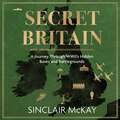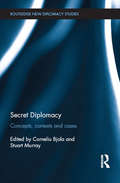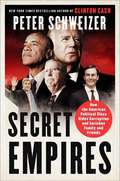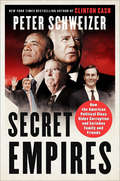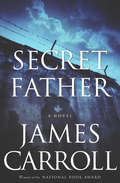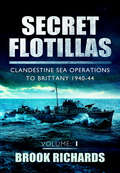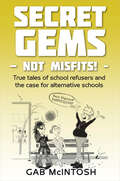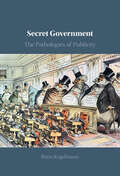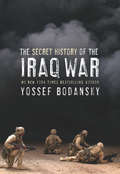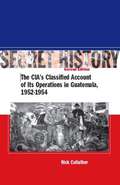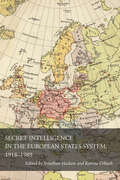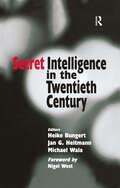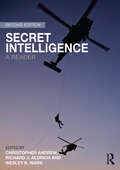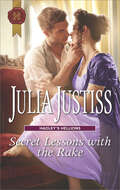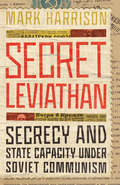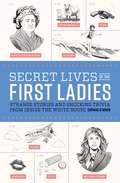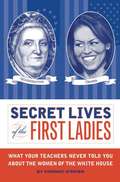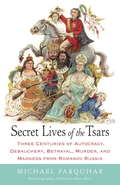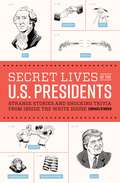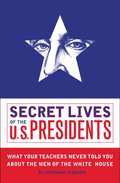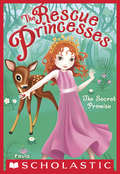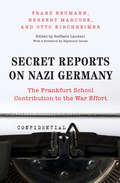- Table View
- List View
Secret Britain: A journey through the Second World War's hidden bases and battlegrounds
by Sinclair McKayDiscover the stories of the brave men and women who worked, trained and fought across the UK, from Bletchley Park in southern England all the way to Arisaig in northern Scotland, in an unbelievable effort to defeat the Nazis and win the Second World War .From the outset of the war, most of Britain felt like a mystery even to those who lived there. All road and railway signs were removed up and down the country to thwart potential enemy spies. An invisible web of cunning spread across the United Kingdom; secret laboratories were hidden in marshes, underground bases were built to conceal key strategic plans and grand country houses became secret and silent locations for eccentric boffins to do their confidential cryptography work.In Secret Britain, Sinclair McKay maps out the UK through the hidden bases and battlegrounds of WWII. These locations are full of history and intrigue, but if you don't know where to look, you might just miss them. Journeying through secret wildernesses, suburbs, underground tunnels and manor houses, Sinclair gives a glimpse into the stories of the incredible people behind the war effort, and shows how you might be able to visit these mysterious and evocative locations yourself.With his trademark warmth and compassion, Sinclair unearths the truths of the war that have remained under layers of secrecy since the war was won in 1945.(P) 2021 Headline Publishing Group Ltd
Secret Diplomacy: Concepts, Contexts and Cases (Routledge New Diplomacy Studies)
by Stuart Murray Corneliu BjolaThis volume investigates secret diplomacy with the aim of understanding its role in shaping foreign policy. Recent events, including covert intelligence gathering operations, accusations of spying, and the leaking of sensitive government documents, have demonstrated that secrecy endures as a crucial, yet overlooked, aspect of international diplomacy. The book brings together different research programmes and views on secret diplomacy and integrates them into a coherent analytical framework, thereby filling an important gap in the literature. The aim is to stimulate, generate and direct the further development of theoretical understandings of secret diplomacy by highlighting ‘gaps’ in existing bodies of knowledge. To this end, the volume is structured around three distinct themes: concepts, contexts and cases. The first section elaborates on the different meanings and manifestations of the concept; the second part examines basic contexts that underpin the practice of secret diplomacy; while the third section presents a series of empirical cases of particular relevance for contemporary diplomatic practice. While the fundamental conditions diplomacy seeks to overcome – alienation, estrangement and separation – are imbued with distrust and secrecy, this volume highlights that, if anything, secret diplomacy is a vital, if misunderstood and unfairly criticised, aspect of diplomacy. This book will be of much interest to students of diplomacy, intelligence studies, foreign policy and IR in general.
Secret Empire: Eisenhower, the CIA, and the Hidden Story of America's Space Espionage
by Philip TaubmanThe espionage in space generated by the Cold War.
Secret Empires: How The American Political Class Hides Corruption And Enriches Family And Friends
by Peter SchweizerPeter Schweizer has been fighting corruption—and winning—for years. In Throw Them All Out, he exposed insider trading by members of Congress, leading to the passage of the STOCK Act. In Extortion, he uncovered how politicians use mafia-like tactics to enrich themselves. And in Clinton Cash, he revealed the Clintons’ massive money machine and sparked an FBI investigation. <P><P> Now he explains how a new corruption has taken hold, involving larger sums of money than ever before. Stuffing tens of thousands of dollars into a freezer has morphed into multibillion-dollar equity deals done in the dark corners of the world. <P><P> An American bank opening in China would be prohibited by US law from hiring a slew of family members of top Chinese politicians. However, a Chinese bank opening in America can hire anyone it wants. It can even invite the friends and families of American politicians to invest in can’t-lose deals. <P><P> President Donald Trump’s children have made front pages across the world for their dicey transactions. However, the media has barely looked into questionable deals made by those close to Barack Obama, Joe Biden, John Kerry, Mitch McConnell, and lesser-known politicians who have been in the game longer. <P><P> In many parts of the world, the children of powerful political figures go into business and profit handsomely, not necessarily because they are good at it, but because people want to curry favor with their influential parents. This is a relatively new phenomenon in the United States. But for relatives of some prominent political families, we may already be talking about hundreds of millions of dollars. <P><P> Deeply researched and packed with shocking revelations, Secret Empires identifies public servants who cannot be trusted and provides a path toward a more accountable government.
Secret Empires: How the American Political Class Hides Corruption and Enriches Family and Friends
by Peter SchweizerFrom the New York Times bestselling author of Clinton Cash comes an explosive new political expose! <P><b>A New York Times Bestseller</b>
Secret Father: A Novel
by James CarrollFrom a New York Times–bestselling author, a &“gripping and beautifully written&” novel of love and family set against the backdrop of Cold War Berlin (Bookpage). Berlin, 1961. Days before the Wall rises, three teenagers from an American school in West Germany travel to the Communist side of the divided city to join a May Day rally. One of them has brought along a flight bag belonging to his father, a US intelligence officer. Before long, the teens are in the custody of the secret East German police, the notorious Stasi. Unbeknownst to them, their parents have unfinished business, reaching back to World War II, which will pull the three friends into the vortex of an international incident. Told through flashbacks by alternating narrators, Secret Father is a novel of missed signals, cloaked motives, false postures, and panicked responses that tragically echo across borders and generations. Like the classic period thrillers of Graham Greene, James Carroll&’s politically charged coming-of-age tale provides a &“somber and evocative look at some of the most frightening times in one of the most frightening places in the Cold War&” (Kirkus Reviews). &“Carroll writes with rich, lyrical ease,&” raves Publishers Weekly. &“His characters are richly drawn, and the pieces of his impeccably paced story fit together with the cool precision of a Mercedes-Benz.&”
Secret Flotillas: Clandestine Sea Operations to Brittany, 1940–44
by Brook RichardsAs the fall of France took place, almost the entire coastline of Western Europe was in German hands. Clandestine sea transport operations provided lines of vital intelligence for wartime Britain. These "secret flotillas" landed and picked up agents in and from France, and ferried Allied evaders and escapees. This activity was crucial to the SIS (Secret Intelligence Service) and the SOE (Special Operations Executive). This authoritative publication by the official historian, the late Sir Brooks Richards, vividly describes and analyses the clandestine naval operations that took place during WWII. The account has been made possible through Sir Brooks' access to closed government archives, combined with his own wartime experiences and the recollections of many of those involved.First published in 1996, the original edition included descriptions of naval operations off French North Africa. The history has now been amended and expanded by Sir Brooks and is now published in two volumes. This first volume concentrates on the sea lines to Brittany.This authoritative publication by the official historian, the late Sir Brooks Richards, vividly describes and analyses the clandestine naval operations that took place during World War Two.
Secret Gems - not Misfits!: True tales of school refusers and the case for alternative schools
by Gab McIntoshQuirky learning and unexpected happiness for school refusers at alternative schools - really? Who would have thought that school refusers turn out to be secret gems rather than sad misfits? The reader learns how the principal began her alternative schools with no money, no teaching resources, no premises, and few guidelines. One trained teacher; she was it. The only truly dependable resource was unhappy school kids, more than anyone expected. The results are both surprising and delightful. “Secret Gems - not Misfits! True tales of school refusers and the case for alternative schools” puts forwards the case for alternative schools and why they are so desperately needed all over the country. In an age where teachers are leaving their profession in droves, where kids academic results seem to stagnate, or plummet, alternative schools provide a refreshing insight into how we can do schooling differently and make education enjoyable again for teachers, parents and all kids, but particularly those kids called to the beat of a drum.
Secret Government: The Pathologies of Publicity
by Brian KogelmannAmong politicians and policy-makers it is almost universally assumed that more transparency in government is better. Until now, philosophers have almost completely ignored the topic of transparency, and when it is discussed there seems to be an assumption (shared with politicians and policy-makers) that increased transparency is a good thing, which results in no serious attempt to justify it. In this book Brian Kogelmann shows that the standard narrative is false and that many arguments in defence of transparency are weak. He offers a comprehensive philosophical analysis of transparency in government, examining both abstract normative defences of transparency, and transparency's role in the theory of institutional design. His book shows that even when the arguments in favour of transparency are compelling, the costs associated with it are just as forceful as the original arguments themselves, and that strong arguments can be made in defence of more opaque institutions.
Secret History of the Iraq War
by Yossef BodanskyIn the months leading up to March 2003, fresh from its swift and heady victory in Afghanistan, the Bush administration mobilized the United States armed forces to overthrow the government of Iraq. Eight months after the president declared an end to major combat operations, Saddam Hussein was captured in a farmhouse in Al-Dawr. And yet neither peace nor democracy has taken hold in Iraq; instead the country has plunged into terrorist insurgency and guerrilla warfare, with no end in sight.What went wrong?<P> In The Secret History of the Iraq War, bestselling author Yossef Bodansky offers an astonishing new account of the war and its aftermath—a war that was doomed from the start, he argues, by the massive and systemic failures of the American intelligence community. Drawing back the curtain of politicized debate, Bodansky—a longtime expert and director of the Congressional Task Force on Terrorism and Unconventional Warfare—reveals that nearly every aspect of America's conflict with Iraq has been misunderstood, in both the court of public opinion and the White House itself. Among his revelations:<P> * The most authoritative account of Saddam Hussein's support for Islamic terrorist organizations—including extensive new reporting on his active cooperation with al-Qaeda in Iraq long after the fall of Baghdad<P> * Extensive new information on Iraq's major chemical and biological weapons programs—including North Korea's role in building still-undetected secret storage facilities and Iraq's transfer of banned materials to Syria, Iran, and Libya <P> * The first account of Saddam's plan for Iraq, Syria, and Iran to join Yasser Arafat's Palestinian forces to attack Israel, throw the region into turmoil, and upend the American campaign<P> * The untold story of Russia's attempt to launch a coup against Saddam before the war—and how the CIA thwarted it by ensuring that Iraq was forewarned<P> * Dramatic details about Saddam's final days on the run, including the untold story of a near miss with U.S. troops and the stunning revelation that Saddam was already in custody at the time of his capture—and was probably betrayed by members of his own Tikriti clan<P> * The definitive account of the anti-U.S. resistance and uprising in Iraq, as the American invasion ignited an Islamic jihad and Iran-inspired intifada, threatening to plunge the region into irreversible chaos fueled by hatred and revenge<P> * Revelations about the direct involvement of Osama bin Laden in the terrorism campaigns in Iraq, Saudi Arabia, and the rest of the Middle East—including the major role played by Iran and HizbAllah in al-Qaeda's operations<P> Drawing upon an extraordinary wealth of previously untapped intelligence and regional sources, The Secret History of the Iraq War presents the most detailed, fascinating, and convincing account of the most controversial war of our times—and offers a sobering indictment of an intelligence system that failed the White House, the American military, and the people of the Middle East.
Secret History, Second Edition
by Nick CullatherWhen the first edition was published in 1999, says Cullather (history, Indiana U. ), his study concerned a secretive episode in the cold war in Central America, but now it reveals an early precedent for regime change and the global path of action pursued in the war on terror. He has not altered the text but appends some of the more significant documents that were released by the US State Department in 2003. Annotation ©2007 Book News, Inc. , Portland, OR (booknews. com)
Secret Intelligence in the European States System, 1918-1989
by Jonathan Haslam Karina UrbachThe history of secret intelligence, like secret intelligence itself, is fraught with difficulties surrounding both the reliability and completeness of the sources, and the motivations behind their release#151;which can be the product of ongoing propaganda efforts as well as competition among agencies. Indeed, these difficulties lead to the Scylla and Charybdis of overestimating the importance of secret intelligence for foreign policy and statecraft and also underestimating its importance in these same areas#151;problems that generally beset the actual use of secret intelligence in modern states. But in recent decades, traditional perspectives have given ground and judgments have been revised in light of new evidence. This volume brings together a collection of essays avoiding the traditional pitfalls while carrying out the essential task of analyzing the recent evidence concerning the history of the European state system of the last century. The essays offer an array of insight across countries and across time. Together they highlight the critical importance of the prevailing domestic circumstances#151;technological, governmental, ideological, cultural, financial#151;in which intelligence operates. A keen interdisciplinary eye focused on these developments leaves us with a far more complete understanding of secret intelligence in Europe than we've had before.
Secret Intelligence in the Twentieth Century (Studies In Intelligence Ser.)
by Heike Bungert Jan G. Heitmann Michael WalaThis work investigates the connection between intelligence history, domestic policy, military history and foreign relations in a time of increasing bureaucratization of the modern state. The issues of globalization of foreign relations and the development of modern communication are also discussed.
Secret Intelligence: A Reader
by Christopher Andrew Richard J. Aldrich Wesley WarkThe second edition of Secret Intelligence: A Reader brings together key essays from the field of intelligence studies, blending classic works on concepts and approaches with more recent essays dealing with current issues and ongoing debates about the future of intelligence. Secret intelligence has never enjoyed a higher profile. The events of 9/11, the conflicts in Iraq and Afghanistan, the missing WMD controversy, public debates over prisoner interrogation, together with the revelations of figures such as Edward Snowden, recent cyber attacks and the rise of 'hybrid warfare' have all contributed to make this a ‘hot’ subject over the past two decades. Aiming to be more comprehensive than existing books, and to achieve truly international coverage of the field, this book provides key readings and supporting material for students and course convenors. It is divided into four main sections, each of which includes full summaries of each article, further reading suggestions and student questions: • The intelligence cycle • Intelligence, counter-terrorism and security • Ethics, accountability and secrecy • Intelligence and the new warfare This new edition contains essays by leading scholars in the field and will be essential reading for students of intelligence studies, strategic studies, international security and political science in general, and of interest to anyone wishing to understand the current relationship between intelligence and policy-making.
Secret Lessons with the Rake (Hadley's Hellions #4)
by Julia JustissThe series of four friends united by power, privilege and the daring pursuit of passion comes to “a deeply romantic and satisfying end” (All About Romance).The courtesan’s courtship . . .Pursuing a role in Parliament, Christopher Lattimar needs a virtuous marriage to make society overlook his roguish past. When beautiful and disarming Ellie Parmenter offers to reform and refine him, he’s too tempted to say no.Once a courtesan, Ellie knows a thing or two about polishing a diamond in the rough. She has no designs on Christopher—or any man in search of a wife—but their best-laid plans begin to tumble once lessons in respectability turn to seduction . . .“A terrific love story, defying proper society and its staid rules. All the Hellions have found their HEA and not a single one of them were conventional, with each man standing up to society’s norms and expectations to right wrongs and overcome unreasonable barriers . . . Julia keeps the storyline fresh and interesting without compromising the genre!” —The Book Review
Secret Leviathan: Secrecy and State Capacity under Soviet Communism (Stanford–Hoover Series on Authoritarianism)
by Mark HarrisonThe Soviet Union was one of the most secretive states that ever existed. Defended by a complex apparatus of rules and checks administered by the secret police, the Soviet state had seemingly unprecedented capabilities based on its near monopoly of productive capital, monolithic authority, and secretive decision making. But behind the scenes, Soviet secrecy was double-edged: it raised transaction costs, incentivized indecision, compromised the effectiveness of government officials, eroded citizens' trust in institutions and in each other, and led to a secretive society and an uninformed elite. The result is what this book calls the secrecy/capacity tradeoff: a bargain in which the Soviet state accepted the reduction of state capacity as the cost of ensuring its own survival. This book is the first comprehensive, analytical, multi-faceted history of Soviet secrecy in the English language. Harrison combines quantitative and qualitative evidence to evaluate the impact of secrecy on Soviet state capacity from the 1917 Bolshevik Revolution to the collapse of the Soviet Union in 1991. Based on multiple years of research in once-secret Soviet-era archives, this book addresses two gaps in history and social science: one the core role of secrecy in building and stabilizing the communist states of the twentieth century; the other the corrosive effects of secrecy on the capabilities of authoritarian states.
Secret Lives of the Civil War
by Cormac O'Brien Monika SuteskiLegendary Heroes of U.S. History--As You've Never Seen Them Before! Secret Lives of the Civil War features irreverent and uncensored profiles of men and women from the Union and the Confederacy--complete with hundreds of little-known and downright bizarre facts. You'll discover that: * Mary Todd Lincoln claimed to receive valuable military strategies from ghosts in the spirit world. * Jefferson Davis once imported camels for soldiers stationed in the American southwest. * Ulysses S. Grant spent much of the Vicksburg campaign on a horse named "Kangaroo." * James Longstreet fought the Battle of Antietam wearing carpet slippers. * William T. Sherman was the victim of two shipwrecks on the same day. * Harriet Tubman experienced frequent and bizarre hallucinations. * Stonewall Jackson was a notorious hypochondriac (he always sat up straight, fearing that slouching would compress his vital organs). With chapters on everyone from William Quantrill (a guerilla leader whose skull later ended up in the basement of a fraternity house) to Rose O'Neal Greenhow (perhaps the South's most glamorous spy), Secret Lives of the Civil War features a mix of famous faces and unsung heroes. American history was never this much fun in school!
Secret Lives of the First Ladies
by Cormac O'Brien Monika SuteskiScandals, Seduction, Addiction, Adultery, Horrific Fashions--And the White House?!? Your high school history teachers never gave you a book like this one! Secret Lives of the First Ladies features outrageous and uncensored profiles of the women of the White House--complete with hundreds of little-known, politically incorrect, and downright wacko facts. You'll discover that: * Dolley Madison loved to chew tobacco * Mary Todd Lincoln conducted séances on a regular basis * Eleanor Roosevelt and Ellen Wilson both carried guns * Jacqueline Kennedy spent $121,000 on her wardrobe in a single year * Betty Ford liked to chat on CB radios--her handle was "First Mama" * Hillary Clinton dreamed of being an astronaut * And much, much more With chapters on every woman who's ever made it to the White House, Secret Lives of the First Ladies tackles all of the tough questions that other history books are afraid to ask: How many of these women owned slaves? Which ones were cheating on their husbands? And why was Eleanor Roosevelt serving hot dogs to the King and Queen of England? American history was never this much fun in school!From the Trade Paperback edition.
Secret Lives of the First Ladies: What Your Teachers Never Told You About the Women of the White House
by Cormac O'BrienFrom the author of our popular Secret Lives of the U. S. Presidents comes another rambunctious look at White House history and this time, women are in the spotlight. Secrets Lives of the First Ladies features outrageous and uncensored profiles of all the presidents' wives. You'll discover that Dolley Madison loved to chew tobacco. Mary Todd Lincoln was committed to an asylum, and Mamie Eisenhower never missed an episode of As the World Turns. You'll also learn why Hillary Clinton went to work for Wal-Mart (long before she started campaigning for a higher minimum wage). Complete with biographies of every first lady, Secret Lives of the First Ladies tackles rough questions that other history books are afraid to ask: How many of these women owned slaves? Which ones were cheating on their husbands? And why did Eleanor Roosevelt serve hot dogs to the Kings and Queens of England? American history was never this much fun!
Secret Lives of the Tsars
by Michael Farquhar"Michael Farquhar doesn't write about history the way, say, Doris Kearns Goodwin does. He writes about history the way Doris Kearns Goodwin's smart-ass, reprobate kid brother might. I, for one, prefer it."--Gene Weingarten, two-time Pulitzer Prize winner and Washington Post columnist Scandal! Intrigue! Cossacks! Here the world's most engaging royal historian chronicles the world's most fascinating imperial dynasty: the Romanovs, whose three-hundred-year reign was remarkable for its shocking violence, spectacular excess, and unimaginable venality. In this incredibly entertaining history, Michael Farquhar collects the best, most captivating true tales of Romanov iniquity. We meet Catherine the Great, with her endless parade of virile young lovers (none of them of the equine variety); her unhinged son, Paul I, who ordered the bones of one of his mother's paramours dug out of its grave and tossed into a gorge; and Grigori Rasputin, the "Mad Monk," whose mesmeric domination of the last of the Romanov tsars helped lead to the monarchy's undoing. From Peter the Great's penchant for personally beheading his recalcitrant subjects (he kept the severed head of one of his mistresses pickled in alcohol) to Nicholas and Alexandra's brutal demise at the hands of the Bolsheviks, Secret Lives of the Tsars captures all the splendor and infamy that was Imperial Russia. Praise for Michael Farquhar's Behind the Palace Doors "[A] rollicking account of kings and queens gone wild."--People "Farquhar's style is a breezy pleasure throughout."--Publishers Weekly "A terrifically accessible history."--Kirkus Reviews
Secret Lives of the U.S. Presidents: Strange Stories and Shocking Trivia from Inside the White House (Secret Lives #1)
by Cormac O'BrienIncludes all-new chapter for the 45th POTUS.This updated and redesigned edition of Secret Lives of the U.S. Presidents features outrageous and uncensored profiles of our commanders in chief—complete with hundreds of little-known, politically incorrect, and downright wacko facts. You’ll discover that: • Teddy Roosevelt was blinded in a White House boxing match • John Quincy Adams loved to skinny-dip in the Potomac River • Gerald Ford once worked as a Cosmopolitan magazine cover model • Warren G. Harding gambled with White House china when he ran low on cash • Jimmy Carter reported a UFO sighting in Georgia With chapters on everyone from George Washington to President #45, whoever he (or she!) may be, Secret Lives of the U.S. Presidents tackles all the tough questions that other history books are afraid to ask: Which president claimed that God struck down Abraham Lincoln on purpose? How many of these folks were cheating on their spouses? And are there really secret tunnels underneath the White House? American history was never this much fun in school!
Secret Lives of the U.S. Presidents: What Your Teachers Never Told You About the Men of the White House
by Cormac O'BrienYour high school history teachers never gave you a book like this one! Secret Lives of the U.S. Presidents features outrageous and uncensored profiles of the men in the White House - complete with hundreds of little-known, politically incorrect, and downright wacko facts. You'll discover that: - George Washington spent a whopping 7% of his salary on booze - John Quincy Adams loved to skinny-dip in the Potomac River - Warren G. Harding gambled with White House china when he ran low on cash - Jimmy Carter reported a UFO sighting in Georgia - And Richard Nixon ... sheesh, don't get us started on Nixon! With chapters on everyone from George Washington to G. W. Bush, Secret Lives of the U. S. Presidents tackles all the tough questions that other history books are afraid to answer: Are there really secret tunnels underneath the White House? How many presidential daughters have bared their all for Playboy? And what was Nancy Reagan thinking when she appeared on Diff'rent Strokes? American history was never this much fun in school!
Secret Promise: Secret Promise (The Rescue Princesses #1)
by Paula HarrisonThese are no ordinary princesses . . . they're Rescue Princesses!Princess Emily sometimes wishes that being a princess meant more than wearing fancy dresses and performing endless curtsies. She longs for a life-changing adventure-and she may just get one!Someone is plotting to hurt the deer who live in beautiful Mistberg Forest. Together with some new friends, Emily will have to use her smarts, her savvy, and even some newfound ninja skills to save them.
Secret Reports on Nazi Germany: The Frankfurt School Contribution to the War Effort
by Herbert Marcuse Franz Neumann Otto KirchheimerA groundbreaking book that gathers key wartime intelligence reportsDuring the Second World War, three prominent members of the Frankfurt School—Franz Neumann, Herbert Marcuse, and Otto Kirchheimer—worked as intelligence analysts for the Office of Strategic Services, the wartime forerunner of the CIA. This book brings together their most important intelligence reports on Nazi Germany, most of them published here for the first time.These reports provide a fresh perspective on Hitler's regime and the Second World War, and a fascinating window on Frankfurt School critical theory. They develop a detailed analysis of Nazism as a social and economic system and the role of anti-Semitism in Nazism, as well as a coherent plan for the reconstruction of postwar Germany as a democratic political system with a socialist economy. These reports played a significant role in the development of postwar Allied policy, including denazification and the preparation of the Nuremberg Trials. They also reveal how wartime intelligence analysis shaped the intellectual agendas of these three important German-Jewish scholars who fled Nazi persecution prior to the war.Secret Reports on Nazi Germany features a foreword by Raymond Geuss as well as a comprehensive general introduction by Raffaele Laudani that puts these writings in historical and intellectual context.
Secret Service
by Reg Whitaker Gregory S. Kealey Andrew ParnabySecret Service provides the first comprehensive history of political policing in Canada - from its beginnings in the mid-nineteenth century, through two world wars and the Cold War to the more recent 'war on terror.' This book reveals the extent, focus, and politics of government-sponsored surveillance and intelligence-gathering operations.Drawing on previously classified government records, the authors reveal that for over 150 years, Canada has run spy operations largely hidden from public or parliamentary scrutiny - complete with undercover agents, secret sources, agent provocateurs, coded communications, elaborate files, and all the usual apparatus of deception and betrayal so familiar to fans of spy fiction. As they argue, what makes Canada unique among Western countries is its insistent focus of its surveillance inwards, and usually against Canadian citizens.Secret Service highlights the many tensions that arise when undercover police and their covert methods are deployed too freely in a liberal democratic society. It will prove invaluable to readers attuned to contemporary debates about policing, national security, and civil rights in a post-9/11 world.
